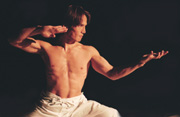
Welcome to Part 2 of a 3-Part Series on Feng Shui remedies.
In the first article, I outlined that there are 3 major categories of feng shui remedies to improve a home or work environment. Feng Shui is the ancient Chinese earth science which can predict the fortunes or misfortunes of occupants who inhabit certain house types or buildings. The first major category was to simply avoid the negative features which cannot be rectified because it would be too costly or impractical to even try. (view back issue # 2 for part 1)
The second category of remedies
is to adjust a home or office that you are obligated to remain in. How does
a feng shui practitioner improve a space that has been deemed unbalanced or
undermining?
Here is a sampling of solutions:

Water means real water, such as a fountain or aquarium. Wood is represented by a live plant or a large surface of green color. Actual fire produces the fire element, like burning candles, but it is safest to represent fire with red and maroon color. The earth element is something really made out of stone or soil, such as a stone pedestal or marble object. When metal element is needed, anything made out of copper, brass, or bronze will work. So a brass bed frame or an iron end table will qualify as metal.
Another way to improve a space which cannot be avoided is to place the furnishings in a specific arrangement, so that the ch'i (air currents) will flow smoothly throughout the room. The goal is to not have air currents move too quickly nor too slowly. If you have room filled with clutter, then the ch'i will not circulate enough. If you have a room that is nearly empty, with a door directly aligned with a window or another door, then the ch'i moves too quickly and the occupants of the room will feel unproductive and distracted. Worst case scenario is that people cannot be as healthy or prosperous in a house that chronically "leaks" its energy.
The yin-yang theory explores
the effects of an environment that is extreme. Yin represents the feminine,
more subdued principles while yang signifies the
active, masculine attributes of a room. If a room is too dark (yin) then people
will get sick and depressed. If the room is too bright (yang) occupants will
be irritable and receive headaches. Neither extreme is desirable in feng shui
theory.
To conclude, it is natural elements, healthy air flow, and common-sense good design which are the essential ingredients that go into "loving the space you're with."
Look for Part 3 in the next issue of Melt magazine, which will explain why an environment may be good for one person and not another.
|
©
Melt Magazine 2001
|
||